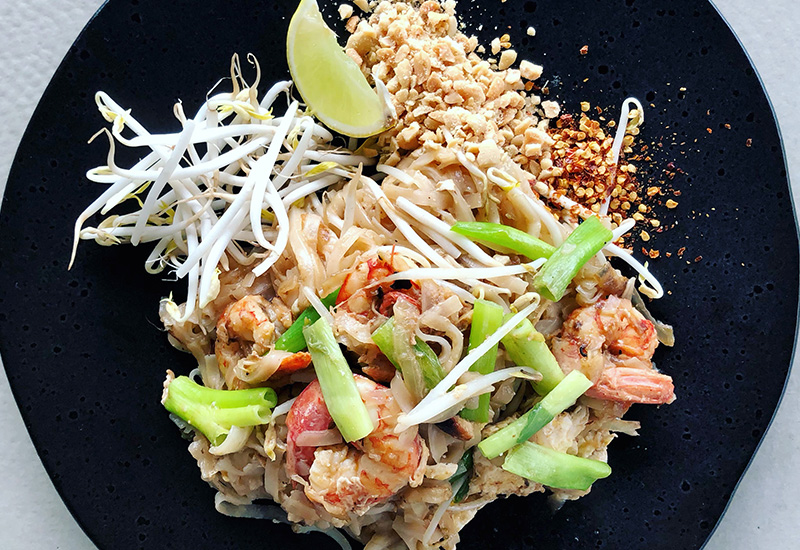Pad Thai is one of Thailand’s most popular dishes and loved by everyone. To tell you the truth, I never made Pad Thai until we migrated to Portugal. This classic Thai dish is so easily available everywhere in Asia that no one bothers to make it themselves. With fewer options for Asian food in the Algarve you might consider it worth the effort.

Pad Thai is a little labour-intensive but it is so worth it. That sweet, salty, sour, umami combination on a plate promises to leave you salivating. This is a prawn version, my favourite, but you can also substitute prawn with the protein of your choice, for example, chicken. I hope you make time to try this recipe and that you will love it as much as I do.
Ingredients
- 150gm flat rice noodle sticks
- 1 ½ tbsp vegetable oil
- 2 garlic cloves minced
- 1 small onion or shallot diced
- 1 egg
- 6–8 prawns peeled and deveined
- 1 cup bean sprouts
- 1 cup garlic chives or spring onions
- ½ cup peanuts chopped roughly
- 1 lime cut in wedges
- 1 tsp chilli flakes or ground piri piri
Sauce
- 1 ½ tbsp Thai oyster sauce
- 2 tbsp fish sauce
- 1 ½ tbsp tamarind paste or puree
- 1 tbsp sugar
- Pinch of salt
Instructions
Soak the rice noodles in cold water for 40–45 minutes. Your noodles should soften to the touch but remain firm, and look a little less translucent than before. Drain and set aside. Mix the sauce column of ingredients together in a small bowl as the stirfry will go quickly and requires you to stir constantly. Heat up your wok with oil and fry onions and garlic for a minute until the aromas begin to waft.
Now, add the prawns and as soon as they start to pink, push them aside and crack your egg right into the centre of your wok. Add a pinch of salt and scramble with a wooden spoon.
Throw in the rice noodles, followed by your sauce concoction. You will want to continue stirring at this point, ensuring that your noodles separate nicely and are coated evenly with all that yummy sauce. You will notice your noodles begin to take on a caramelised hue as it absorbs all that sauce as you continue stirring for the next five minutes. If you are unsure if your noodles are cooked, you can always do a bite test (like you would with pasta).
If you are happy with the texture, stir in half a cup of bean sprouts, the same amount of garlic chives or spring onions and the peanuts. Give it a quick stir, to bring it all together. Your noodles are now ready and should be served immediately.
Traditionally, Pad Thai is served with fresh bean sprouts, chilli flakes, wedges of lime, chives or spring onions and crushed peanuts on the side. If none of these excites you, feel free to eliminate them. This recipe makes a generous portion for one and can also be shared by two.

Wine pairing
Our favourite Portuguese sommelier, Sofia of Mosto Wine and Tapas Bar in Lagos, recommends Entre II Santos, Sauvignon Blanc. Light peach and apple aromas, balanced acidity, and fresh and fruity hues are perfect to pair with the intense flavours of Pad Thai.
Where to shop?
Go Dutch
This Dutch shop stocks most of what I need with a very good selection of Asian sauces, many Indonesian condiments and a frozen section with the likes of wonton wrappers and kaffir lime leaves. (R. Gomes Vinagre 13 Loja 2, 8600-315 Lagos)
Continente
You will be able to find a decent selection of Asian sauces in the dry goods aisle and a variety of noodles, too.
Intermarché
From Asian noodles to sauces and other ingredients, the Asian section also has a really nice selection of Indian food items which you might enjoy. I also love that they always have fresh turmeric, chillies, Pak Choi, lemongrass and spring onions
Asia Supermarket
If you can afford to go a little bit further, the nearest full-on Asian grocer is in Albufeira. They stock just about anything you will need for an Asian cook for Chinese, Thai, Vietnamese, Indonesian and even Malaysian dishes. (Beco da Felosa 33, 8200-182 Albufeira)
Joy Entry is a Malaysian home cook based in Lagos who is obsessed with the provocative, unapologetic flavours of South-East Asian cuisine
Instagram: @thatasianhomecook













